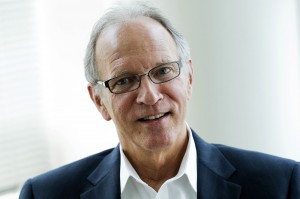
Dr. Ronald Corley, a professor of microbiology and current BU Medical Campus associate provost for research, was appointed as the new director of Boston University’s National Emerging Infectious Diseases Laboratories, effective October 1, BU announced Monday.
Jack Murphy, NEIDL’s interim director, will shift to NEIDL’s associate director and Corley will no longer serve as an associate provost, Corley said.
“Working with the ADs [associate directors], faculty in the NEIDL and other stakeholders from around the university, my job is to build the NEIDL into a premier EID [Emerging Infectious Diseases] research facility, and do so with the utmost attention to safety and security,” Corley said. “I plan on emphasizing public outreach and engagement as part of my role in the NEIDL.”
NEIDL — a facility in the South End designed to study diseases that pose a significant risk to public health — is one of only two university laboratories in the nation that handles cases as extreme as Biosafety Level 4, a designation used for high-risk pathogens such as Ebola. Corley said he anticipates the laboratory will be open within a year, though the process to begin full operations has been difficult.
After months of deliberation, the Boston City Council voted in May to allow BSL-4 research in the city, a process Corley helped see through as NEIDL’s associate director.
NEIDL can begin conducting research once the facility is given permission to operate from the Boston Public Health Commission and the Centers for Disease Control and Prevention. The recent international spread of Ebola is just one of several deadly viruses that NEIDL research could help combat, Corley said.
“New emerging diseases are detected at a rate of one every 18 months or so,” he said. “Thus the Ebola outbreak only serves to emphasize the importance of being able to detect, isolate, and study the pathogens, most of which require containment facilities BSL-3 or BSL-4 in order to work safely.”
NEIDL handles cases dealing with BSL-2, BSL-3 and BSL-4 pathogens. While working with bacteria considered to be any of the biosafety levels carries risks, the BSL-4 category includes agents that are often life-threatening and considered extremely hazardous by the CDC.
Corley said he hopes to build NEIDL into a premiere emerging infectious diseases facility with a strong emphasis on diagnostics.
“You tend not to diagnose somebody until they are already symptomatic, and that creates an issue,” he said. “If you could diagnose even a day earlier, it could be a huge advantage for being able to contain these outbreaks.”
One of Corley’s main priorities is attracting faculty recruitments, including undergraduate and graduate students, he said. Their assistance will help push the facility further.
“We already have both undergraduate and graduate students who have worked with faculty that are NEIDL investigators, and they don’t work at BSL-4, or even BSL-3, but they work on projects that have engineering components, bioinformatics components or BSL-2 components,” he said. “One of our missions is to train the next generation of scientists, and so it is absolutely critical that we are open for training.”
Dr. Julie Sandell, BU’s associate provost for faculty affairs, said Corley was a fitting candidate to lead NEIDL as it looks to begin operations.
“He is an outstanding scientist and a collaborative leader,” she said in an email.
Several students said infectious diseases should be a priority in medical research, and they are glad to see that BU hopes to fight the spread of deadly pathogens.
“It’s a major problem in hospitals, keeping diseases from spreading, and especially epidemics around the world,” said Sargent College of Health and Rehabilitation Sciences junior Hallie Dukoff. “That’s something a lot of people should try to get involved with.”
Brittany Comak, a junior in the College of Communication, said given the risks associated with the current spread of Ebola, it is important to develop methods of treatment and prevention for infectious diseases.
“We’re in a time where we’re having a major outbreak, luckily in just one part of the world, but it could easily migrate anywhere else,” she said. “We need scientists working on every part of what’s happening, and it’s really awesome that it’s in Boston because we have some of the best hospitals in the world. It makes a really good name for the school and the city for having something this advanced.”
Paige Smith contributed to the reporting of this article.





















































































































